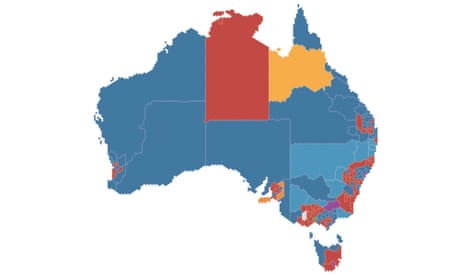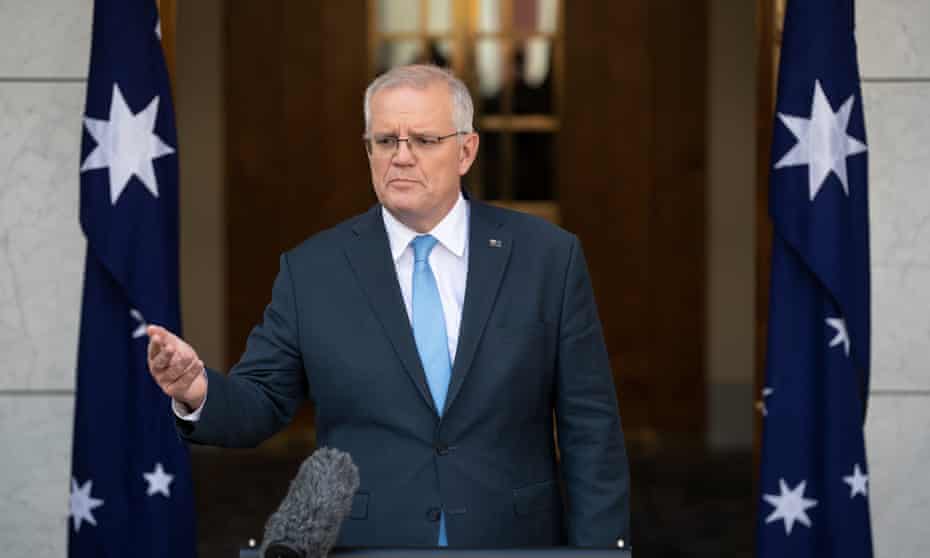Extract from The Guardian
The PM kept it to the tightest of briefs as he launched Australia’s federal election campaign, even omitting Anthony Albanese’s name.
To put it bluntly, Morrison has an “I’m the problem” problem.
So the prime minister swerved around this central difficulty for the Coalition campaign on Sunday by declaring the political contest he’d just opened was about you, the voters, and the risks of an unproven alternative.
Distilled to the essence, the coming election was “a choice between a government you know and a Labor opposition you don’t”.
Interestingly, Morrison didn’t name Anthony Albanese once in Sunday’s opening sortie. The doer of all the unspeakably scary things that would happen if the Coalition loses on 21 May was the “Labor opposition” – a description that conveys two negatives economically to distracted voters. One: Labor is not currently in government. Two: the word “opposition” sounds negative and carping.
Morrison dragged the Labor brand and totally blanked his opponent.
This suggests that at the opening of the 2022 electoral battle, Albanese is not considered a negative by voters. To understand this point, we need only compare Sunday’s pitch with the one Morrison unfurled three years ago.
Back in 2019, Morrison bowled up almost identical formulations about elections being about choices, and about the Coalition being the party of lower taxes and proven economic management.
But last time he namechecked his opponent.
The 2019 election, Morrison said, was “a choice between a government that I lead and the alternative of a Labor government led by Bill Shorten. You will have the choice between a government that is delivering a strong economy and will continue to do so, or Bill Shorten’s Labor party, whose policies would weaken our economy.”
Having judged that he’d landed his lines, the prime minister entertained only six questions before retreating to his office, prompting laughter from the assembled press pack about the hasty retreat (in the spirit of laughing at, rather than with).
The prime minister is clearly opening this fight for his political life – and that’s what he’s now in – exactly as he means to continue.
If Morrison has his way, the next six weeks will not be a freewheeling dialogue, a group hug or a fireside chat. What’s coming between now and 21 May is core Morrison, or at least core political Morrison: brutal, transactional and on-task.
The prime minister intends to rise before dawn, appear at his staged events, landing the messages he wants to land. Then he’ll vamoose before anything gets even remotely sticky.
The sum of these parts tells us Morrison and the Coalition are not starting this contest from a position of political strength.
Morrison’s charm bank, such as it was, is empty.
The devil you know is what the prime minister has, and what he intends to use.
The length of the coming campaign, six weeks instead of five, also tells you Morrison’s chief hope is to first pin his elusive opponent, Albanese – the one he’s been struggling to get a glove on – and then grind the Labor leader down with his buzzing relentlessness.
For his part, Albanese fronted the voters in the commonwealth parliamentary offices in Sydney. On television, that location read as flat and workaday, but presumably the campaign thought the setting looked putatively prime ministerial.
Albanese’s pitch is safe change in an environment where change might feel scary.

He told voters Australia was a great country, but could be “better with a better government”. He said the incumbents had a plan for re-election, a plan to grab a second decade in office, but no plan for the future.
The Labor leader tipped his hat to the grinding relentlessness of the six weeks to come. Fear, he told the voters, can be a “powerful emotion, and I imagine there will be quite a bit over the next few weeks”.
“But I want to appeal to your sense of optimism and desire for a better future, one where there is more work and better-paying jobs, stronger Medicare, cheaper childcare, and a future made here, revitalising Australian manufacturing.”
Apart from what country he might build if given the opportunity, Albanese offered the following on who he is.
The core pitch was: I am decent. I will respect an office that my opponents have disdained and traduced. Labor is ready to govern. I’ve been campaigning since I was a kid. I’ve been deputy prime minister, acting prime minister and chief parliamentary tactician for Kevin Rudd and Julia Gillard. If you put us back in government, I will lead the “most experienced incoming Labor government in history”.
It’s true, Albanese was the glue in the Rudd/Gillard period, the roving diplomat shuttling between the divorcing parents and the crossbench required to maintain Labor’s grip on power.
Albanese works from the inside out. He doesn’t overpromise and he doesn’t sizzle.
He’s had the glow-up, but he’s not used to styling himself as the political frontman with the X factor, and it’s not clear he could be trussed that way, even if that’s what this moment ultimately requires.
If Morrison is the devil Australians know, safety is Albanese’s campaign pitch, with a measure of political qualities perhaps thought to be extinct: hope and humility.

No comments:
Post a Comment